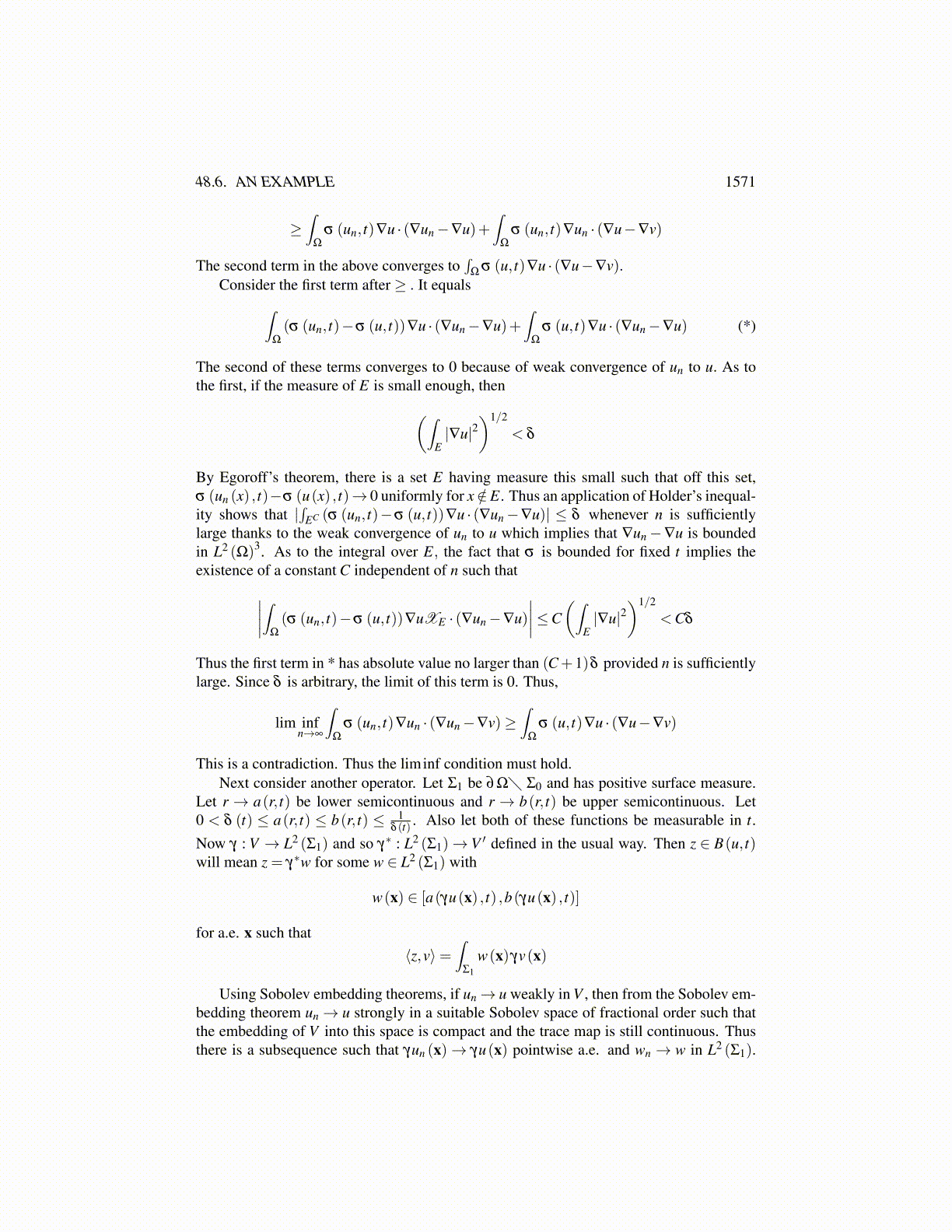
48.5. SOME VARIATIONAL INEQUALITIES 1571
= lim supn(ω)→∞
⟨wB
n(ω) (ω)+wCn(ω) (ω) ,un(ω) (ω)− v
⟩= lim sup
n(ω)→∞
⟨wB
n(ω) (ω)+wCn(ω) (ω) ,un(ω) (ω)− v̂n(ω)
⟩≤ lim sup
n(ω)→∞
⟨f (ω) ,un(ω) (ω)− v̂n(ω)
⟩= ⟨ f (ω) ,u(ω)− v⟩
Note that from standard results, in the case of coercivity and V = K (ω) ,the aboveshows that for f measurable there is a measurable u such that f (ω) ∈ B(u(ω) ,ω) +C (u(ω) ,ω). Specifically, there are measurable functions
wB (ω) ∈ B(u(ω) ,ω) and wC (ω) ∈C (u(ω) ,ω)
such that f (ω) = wC (ω)+wB (ω).
Example 48.5.4 We can let Ω= [0,T ] and let the measurable sets be the Lebesgue measur-able sets, t→ f (t) measurable into V ′. Then for A(·, ·) satisfying 1 - 3 the above theoremgives the solution u,w(t) ,u(t) ∈ K(t) to variational inequalities of the form
⟨ f (t)−w(t) ,z−u(t)⟩ ≤ 0, w(t) ∈ A(u(t) , t)
for all z ∈ K (t) where K (t) is a closed bounded convex subset of V for t → K (t) a mea-surable multifunction. Here both u and w are measurable. If u→ A(u, t) is coercive,this allows for K (t) only closed and convex. If A is the sum of B,C and u→ B(u, t) andu→C (u, t) , these each satisfying the conditions 1 - 3, w(t) = wB (t)+wC (t) where bothof these summands are measurable and wB (t) ∈ B(u(t) , t) ,wC (t) ∈C (u(t) , t). If suitableestimates hold, and f ∈ Lp′ ([0,T ] ;V ′) then one can conclude that w ∈ Lp′ ([0,T ] ;V ′) andu ∈ Lp ([0,T ] ;V ). This paper has resolved the only difficult issue which is existence of ameasurable solution with no monotonicity or uniqueness assumptions on the problem forfixed t.
Example 48.5.5 We can let Ω be of the form [0,T ]×Ω where (Ω,F ) is a measurablespace. In this case, we could let the σ algebra be B×F the product measurable sets andobtain product measurable solutions to the same variational inequalities.
Example 48.5.6 In the case of a filtration {Ft}, one could let the σ algebra consist ofthe progressively measurable sets and obtain the same conclusions. Thus the variationalinequality would be of the form
⟨ f (t,ω)−w(t,ω) ,z−u(t,ω)⟩ ≤ 0, w(t,ω) ∈ A(u(t,ω) , t,ω) ,z ∈ K (t,ω) .
This result is quite interesting because it is describing a situation where there is nouniqueness or monotonicity and all that is required are conditions of measurability on f .Also, one only needs to check the limit conditions on u→A(u,ω) for fixed ω so all Sobolevembedding theorems are available. Nor is it necessary to assume that ω → A(u,ω) is ameasurable multifunction as is often done. It suffices to check that it has a measurableselection. This is a strictly more general condition.